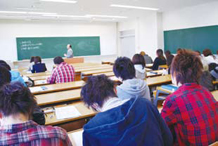

Here, current students provide an overview of life at Akita University.
| MON | TUE | WED | THU | FRI | |
|---|---|---|---|---|---|
| Periods 1 & 2 | Theories on Human Formation B |
Basic Physics |
University English I |
Basic Mathematics 1 |
|
| Periods 3 & 4 | Introductory Chinese E |
Japanese Constitution D |
Introduction to Data Processing D |
Introductory Chinese E |
Geography and Topography I |
| Periods 5 & 6 | University English I |
Basic Chemistry |
Linear Algebra |
Sport Education IE |
|
| Periods 7 & 8 | Medicine and Health IV |
Pedagogics IA |
First Year Seminar |
||
| Periods 9 & 10 | |||||
| Extracurricular | Part-time job |
Club |
Part-time job |

Lessons at university do not consist only of lectures in which students sit and listen to what teachers say but also group work in which they work together to tackle a single issue, or fieldwork conducted outside the campus.
Even conventional lectures in which teachers talk from the podium vary greatly depending on the teacher’s methods. Teachers run their lectures in many forms; some use the blackboard and a projector to give their lectures, while others make very little use of writing, preferring mainly to talk.
Also, students at university are expected to create their own timetables. While taking your specialist and compulsory subjects, you can select other lectures that you like or have an interest in by yourself. And this is not limited to lectures, as there are a range of experiments, seminars and practicals that help students gain an even deeper understanding of their area of study and enable them to master specialist skills. From physics and chemistry experiments to educational and hospital training, you can tailor your timetable in accordance with your department or program.
While the year in which students join a laboratory differs depending on the department or program, once you join a laboratory in your own field of study, there are a series of events held by your laboratory for you to attend. From cherry blossom viewing in a nearby park in spring to barbeques on the beach in summer, the frequency and content of such events varies greatly according to the laboratory. And in some departments and programs, there are also inter-laboratory baseball and softball tournaments, among other things.
Having worked out their timetables, students find that they have free time left over without any lectures, which they use to write reports and revise in the library.
Many students spend this time talking to friends in the dining hall and returning home to their apartments.
And some chose to continue studying outside of lecture time, such as researching things for seminars or preparing materials in groups.
As many students live by themselves, they do part-time jobs to earn a little extra money for their daily lives or to buy something that they want.
There are many opportunities for students seeking part-time work, with options including work in the service industry, cram school teaching or home tutoring, and jobs consisting of short-term work of one or two days to long-term work during the summer vacation.
Students earn an average of ¥30,000 – ¥40,000 a month. And they can earn even more with a little effort. But part-time work is not just about making money, as it forms vital experience in preparing to enter the world of work following graduation.